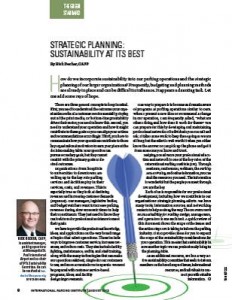How do we incorporate sustainability into our parking operations and the strategic planning of our larger organizations? Frequently, budgeting and planning methods are already in place and can be difficult to influence. It appears a daunting task. Let me add some rays of hope.
There are three general concepts to keep in mind. First, you need to understand the outcomes your organization seeks. If a customer service mentality, staying out of the print media, or bottom-line profitability drives their motor, you need to know this. Second, you need to understand your operation and how it might contribute to these goals so you can align your actions and recommendations accordingly. Third, you have to communicate how your operations contribute to those key organizational motivators to earn your place at the decision-making table. Your operation can pursue secondary goals, but they cannot conflict with the primary goals or desired outcomes.
Organizations from hospitals to universities to downtowns are waking up to the key role parking services and facilities play in their services, costs, and revenues. This is especially true as they look at declining revenues and increasing customer demands (expenses). Our managers, legislative bodies, and budget watchers want to increase parking revenues during slow economic times to help their constituents. They just need to know they can look to us for professional assistance to meet their goals.
We have to provide the professional knowledge, ideas, and applications on the very broad range of topics that affect operations. These include ways to improve customer service, increase revenues, and reduce costs. They also include facility lighting, maintenance, audits, and staff training, along with the many technologies that can make our operations efficient, simple for our customers to use, and more accurate for us to operate. We must be prepared with customer service-based programs, ideas, and facility design improvements.
One way to prepare is to become and remain aware of programs at parking operations similar to ours. When I present a new idea or recommend a change in our operation, I am frequently asked, “What are others doing and how does it work for them?” You can prepare for this by developing and maintaining professional networks of individuals you can call and ask. It takes some work to keep these going as we are all busy, but the effort is well worth it when you either know the answer or can pick up the phone and get it from someone you know and trust.
Helping you advance your professional education and network is one of the key roles of the International Parking Institute (IPI). Through seminars, conferences, webinars, the Parking Matters® Blog, and online information, you can find the resources you need. The information is wonderful but the people you meet through IPI are the key.
Each of us is responsible for our professional development, including how we contribute to our organizations’ strategic planning efforts. We have many tools, information sources, and networking contacts to help us along the way. The IPI Framework on Sustainability for Parking Design, Management, and Operations is one such tool. A quick review of this document shows the scope of the issues and the action steps IPI is taking to inform the parking industry. It also provides ideas for you to expand the scope of the sustainability considerations for your operation. This means that sustainability in now another topic we can professionally bring to the planning table.
As an additional resource, IPI has a very active Sustainability Committee that seeks to inform members on the broad scope of issues, informational resources, and individuals to connect you with valuable information.
Rick Decker, CAPP, is assistant manager, parking operations at Minneapolis/St. Paul International Airport and co-chair of IPI’s Sustainability Committee. He can be reached at rick.decker@mspmac.org or 612.467.0460.
TPP-2012-08-Strategic Planning Sustainability at its Best

